Hier finden Sie eine Auswahl neuerer Publikationen unseres Lehrstuhlteams.
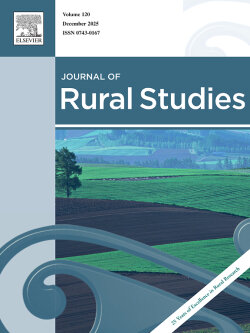
Margit Fauser & Nick Linsel (2026) Agricultural exceptionalism, migrant farmworkers and their transnational condition: Insights into media portrayal in Germany, Journal of Rural Studies 121, 103923. doi:10.1016/j.jrurstud.2025.103923.
In contrast to other economic sectors, agriculture has long been defined by its exceptionalism, which justifies specific regulations and legal exemptions, not least concerning labour laws. Drawing from rural studies, labour studies and transnational migration research, we aim to contribute to an understanding of the existing labour exceptionalism for migrant farmworkers to further the recent scholarship on migration and agriculture. This scholarship has begun to explore the concentration of migrants in seasonal farmwork, analysing migrants' decisions and employers’ choices, and the role of labour law. Our scholarship will add a focus on the media portrayal of migrant farmworkers, which, while not directly matching workers to jobs, reflects and shapes broader societal understanding and can inform political (in)action. Empirically, this paper presents a qualitative analysis of local media discourse on migrant seasonal farmworkers in Germany, which has not received very much attention in the emerging debate. These workers predominantly come from Eastern EU member states, work for the season and then return home. We further adopt a transnational perspective to reveal that the portrayal of the ideal matching of migrant workers to farmwork rests on their transnational condition of working “here” and living “there” and is silent about the externalisation of the costs of social reproduction. Against this backdrop we argue that this media portrayal reflects the discursive normalisation of the exceptional work and employment conditions of these migrant farmworkers through a positive assessment of the underlying transnational labour arbitrage. This further rationalises and legitimises labour exceptionalism for migrant farmworkers.
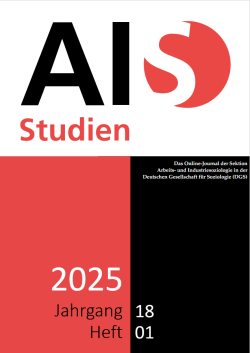
Dana Tholen (2025) Gewerkschaftliche Positionierung zu migrantischer Arbeit in Kontexten der Fragmentierung und Prekarität: Einsichten aus der Paketlieferbranche, AIS-Studien 18(1), 43-57. doi: 10.21241/ssoar.102370
Das Verhältnis von Gewerkschaften zu Migration ist seit jeher von Ambivalenzen zwischen grundsätzlicher Ablehnung und proaktiver Adressierung geprägt - insbesondere in prekarisierten Kontexten. In diesem Beitrag wird eine Dokumentenanalyse vorgestellt, welche die Positionierung der Gewerkschaft Ver.di in der Paketzustellung untersucht, einer Branche, die von Fragmentierung und Prekarisierung gleichwohl wie von einem hohen Anteil migrantischer Beschäftigter geprägt ist. Die Analyse zeigt eine distanzierte Thematisierung migrantischer Arbeit durch die Gewerkschaft. Ich argumentiere, dass diese strategische gewerkschaftliche Positionierung Konsequenz der grundlegenden Fragmentierung des Sektors in zwei Welten ist. Auf Grundlage dieser Analyse erörtere ich, wie Gewerkschaften sich in Kontexten prekärer und migrantisch geprägter Branchen strategisch besser positionieren können.
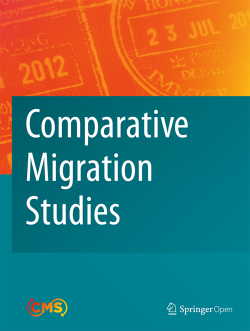
Fred N. Ikanda, Abdirahman A. Muhumad & Jana Kuhnt (2025) Refugee securitization and the challenges of formal integration: case of Somali refugees in Kenya and Ethiopia, Comparative Migration Studies 13(5). DOI: 10.1186/s40878-024-00419-7
Securitization of refugees and migrants is a growing global phenomenon that is well illustrated by how refugee camps have emerged as governmental technologies of control in major host countries across the world. Policymakers and the media prominently feature the migration-security connection and depict refugees as threats to internal security, linking their presence to acts of terrorism and crime. This article examines how the securitization of Somali refugees in Kenya and Ethiopia, the two main host countries for this refugee group, has hindered their formal integration and exacerbated policies of encampment in these countries. Drawing on securitization theory, we highlight the discrimination of Somali refugees in Kenya and Ethiopia by demonstrating how this refugee group is seen as a specific security threat and treated differently from other refugee groups in these countries. A history of border conflicts that shaped the relationship between refugee hosting areas and the national governments long before the advent of camps, coupled with shared Somaliness between locals and refugees in hosting areas, and the back-and-forth refugee movements across international borders have created a confluence of factors that reinforce suspicion and distrust towards Somali refugees. The article adds a normative empirical dimension to securitization theory by providing a nuanced understanding of the concept as it applies to different refugee groups in similar contexts. It also contributes to refugee and migration literature by arguing that although shared Somaliness with locals has strengthened the informal integration of Somali refugees in the two study contexts, the same ties have also provided justification for securitizing this refugee group and denied it from benefitting from progressive laws on formal integration that are being implemented for other refugee groups.
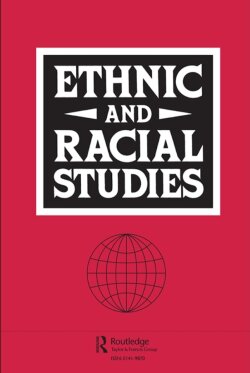
Special Issue of Ethnic and Racial Studies: Mapping the Internal Border
Margit Fauser (2024) Mapping the Internal Border through the City: an Introduction, Ethnic and Racial Studies 47(12), 2477–2498. DOI: 10.1080/01419870.2024.2344693
Elena Fattorelli (2024) Administrative control mechanisms in the descent-based family reunification of refugees, Ethnic and Racial Studies 47(12), 2541–2562. DOI: 10.1080/01419870.2024.2345459
This editorial to the Special Issue introduces the concept of the internal border and presents its individual contributions. It discusses the shift from the borderline toward diverse sites and actors within the territory of the state and points to the border’s still neglected turn to city and urban space, and how this is connected to the external border. In doing so, the introduction explores the meanings of the internal border as a crucial mechanism of ordering and othering that represents, enacts, and creates the line between insiders and outsiders, citizens and non-citizens, along with divisions of racialisation, ethnicity, gender, class, and health. This notion assumes that the practices of bordering articulate social differences mapped onto space. Thus, recognizing the city as urban border space, this introduction proposes studying the border through the city, embedded within a multiscalar and relational framework.
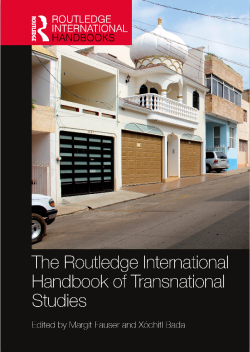
Margit Fauser & Xóchitl Bada (eds.) (2024) The Routledge International Handbook of Transnational Studies. London: Routledge. DOI: 10.4324/9781003329978
The Routledge International Handbook on Transnational Studies offers a comprehensive overview of the dynamic evolution and the most recent debates in this interdisciplinary field. The collection assembles scholarship from the social sciences and the humanities that share a critical perspective extending beyond the nation-state. The contributions investigate sustained connections, events, and activities across state borders and acknowledge prevailing global power asymmetries.
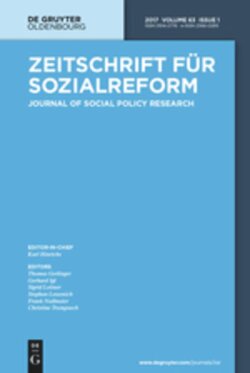
Katrin Menke (2024) Between life course regimes and biographical orientations: labour market trajectories of refugee mothers in Germany from a gendered perspective, Zeitschrift für Sozialreform 70(1), 101-120. doi:10.1515/zsr-2023-0010
Nach ihrer Ankunft stehen Geflüchtete vor der Herausforderung, ihre Biografie in unbekannten sozialen Kontexten neu zu ordnen. Sie sind dabei mit spezifischen Lebenslaufpolitiken, institutionalisierten bürokratischen Prozessen und Normen konfrontiert. Wie gestalten sich Prozesse des Festhaltens an und Anpassens von vertrauten Routinen und Orientierungen bei geflüchteten Frauen mit Sorgeverpflichtungen in Deutschland? Anknüpfend an bestehende Literatur der Lebenslauf-, Flucht- und Biografieforschung ergänzt dieser Artikel den Forschungsstand um eine geschlechtersensible Analyse der Arbeitsmarktverläufe geflüchteter Mütter in Deutschland. Ausgehend von biografisch orientierten Interviews mit 21 Frauen mit Kindern, die zwischen 2015 und 2020 aus überwiegend arabischen Ländern nach Deutschland geflüchtet sind, werden zwei Befunde vorgestellt und diskutiert: a) verschiedene Phasen des Ankommens, die durch verschiedene Lebenslaufpolitiken und Normen gerahmt und in bürokratischen Settings vollzogen werden, sowie b) drei verschiedene Arbeitsmarktorientierungen und -strategien in Abhängigkeit von den gegebenen biografischen Orientierungen der Frauen, deren Neuverhandlung in ungewohnten Umgebungen und der jeweiligen Lebensphase, in der sich die Frauen befinden. Die Ergebnisse liefern neue Erkenntnisse über die biographischen Verläufe der Arbeitsmarktbeteiligung von geflüchteten Frauen und stellen eine überwiegend statische Sichtweise auf diese als homogen dargestellte Gruppe in Bezug auf Qualifikationen, Betreuungspflichten und Erwerbswünsche in Frage.
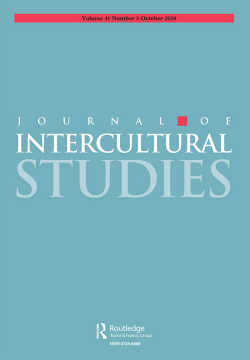
Margit Fauser, Corinna A. Di Stefano & Elena Fattorelli (2023) Multiple Facets of Borderwork. Urban Actors Between Migrants’ Struggles and State Control, Journal of Intercultural Studies, 44:1, 61-76, DOI: 10.1080/07256868.2022.2159340
In this article, we investigate the roles of urban actors supporting migrants’ struggles and confronting state control, focusing on the fields of family reunification and access to health care in the city of Frankfurt am Main. We bring together insights from border studies, street-level theory, and social policy and social work literature to elaborate on the notions of ‘urban border space’ and borderwork to offer a new theorisation on ‘where the border is’ and ‘who makes the border’. Multiple transformations that have taken place in border control and the welfare state regime have led to diverse engagement on the part of civil society towards migrants, particularly in cities. City authorities, in turn, enforce the border, yet also respond to migrants’ exclusion. Here, devolution and collaboration between city and civil society organisations have partly blurred the line between different types of urban actors. Our analysis identifies four roles within urban actors’ borderwork – brokerage, advocacy, direct care and gatekeeping –, each of which is associated with a different relationship with state migration control. We thus argue that the supposed dichotomous relationship between state (re-)bordering and civil society de-bordering is too simplistic and that urban actors’ roles in borderwork are instead multifaceted.
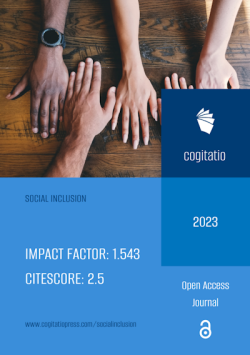
Menke, Katrin / Rumpel, Andrea, 2022: Who belongs, and how far? Refugees and Bureaucrats within the German Active Welfare State. Online first. In: Social Inclusion 10 (1)
Concepts such as “belonging” (Yuval‐Davis, 2011) and “community of value” (Anderson, 2013) try to capture the multiple ways of classifying migrants. In this article, we argue that belonging needs to be analyzed against the backdrop of active social citizenship in European welfare states. Although the literature acknowledges the increasing links between migration and social policies, the latest “turn to activation” in social policy has hardly been accounted for. By focusing on two policy fields in Germany, the labor market and health policies, we briefly describe discourses and social right entitlements and their ambivalences. Empirically we show (a) how bureaucrats within the two policy fields regulate and justify refugees’ social rights in practice and (b) how refugees act vis‐à‐vis relevant institutional opportunity structures. Our study contributes to previous research twofold: Firstly, we illustrate processes of positioning and selecting refugees that stem from recent social policy architecture. Secondly, we demonstrate everyday experiences from refugees’ vis‐á‐vis relevant institutional opportunity structures in Germany. Our results show that inconsistencies within and between social policy fields of one welfare state have to be taken into consideration for further national and transnational research.
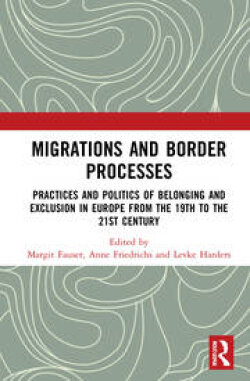
Fauser, M., Friedrichs, A. & Harders, L. (2021). Migrations and Border Processes: Practices and Politics of Belonging and Exclusion in Europe from the Nineteenth to the Twenty-First Century. Routledge.
Current media images of a “fortress Europe” suggest that migrations and borders are closely connected. This special issue brings together scholars from history, sociology and anthropology to explore cross-border mobility and migration during the formation, development, and transformation of the modern (nation-)state explicating the conflictive and fluctuating character of borders. The historical perspective demonstrates that such bordering processes are not new. However, they have developed new dynamics in different historical phases, from the formation of the modern (nation-)state in the nineteenth century to the creation of the European Union during the second half of the twentieth. This introduction explains the dynamic relationships between borders and migratory movements in Europe from the nineteenth century to the present by approaching them from four different, overlapping angles, which the articles analyze in more detail: (1) the multiple actors involved, (2) scales and places of borders and their crossings, (3) the instruments and techniques employed, and (4) the significance of social categories. Focusing on the historical, local specificity of the complex relations between migration and boundaries will help denaturalize the concept of the border as well as further reflection on the shifting definitions of migration and belonging.
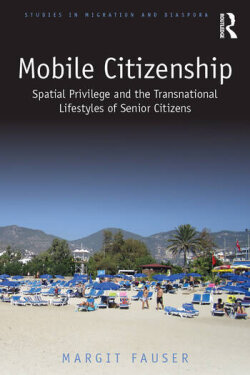
Margit Fauser, 2020, Mobile Citizenship. Spatial privilege and the transnational lifestyle of senior citizens, London: Routledge
Mobile Citizenship addresses the crucial question of how mobility reconfigures citizenship. Engaging with debates on transnationalism, citizenship, and lifestyle migration, the book draws on ethnographic research and interview material collected among retired lifestyle migrants moving south from Germany to Turkey to explore the practices and narratives of these privileged migrants. Revealing the ways in which these migrants relate to their old homes and to their new places, the author examines the social, political, and spatial dimensions of citizenship and belonging and argues that citizenship is key to understanding the privileges of transnational lifestyles. By taking up discussions emanating from studies on other privileged lifestyle migrations—around social welfare and well-being, social participation, and affective belonging, as well as class and racialized privileges—the book exposes particular comparative value and showcases similarities and differences across this emerging type of migration. Mobile Citizenship thus shows how citizenship allows for mobility, resources, and privilege yet is also replete with limitations and ambivalences. The book brings together perspectives on citizenship, space, and privilege and will appeal to social scientists with interests in lifestyle migration and citizenship and their interconnections with global and social inequalities.
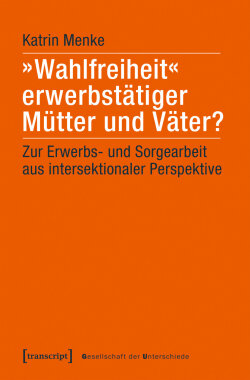
Menke, Katrin, 2019: »Wahlfreiheit« erwerbstätiger Mütter und Väter? Zur Erwerbs- und Sorgearbeit aus intersektionaler Perspektive. Bielefeld: transcript Verlag. Gesellschaft der Unterschiede 53, ISBN: 978-3-8376-4709-9
Der deutsche Wohlfahrtsstaat hat sich gewandelt - und mit ihm seine Familienpolitik. Doch die vordergründigen Fortschritte und Gleichstellungsgewinne erreichen nicht alle Mütter und Väter gleichermaßen: Zentral für die »Wahlfreiheit« von Eltern bei der Gestaltung von Erwerbs- und Sorgearbeit ist und bleibt ihre soziale Positionierung nach Geschlecht, Klasse und Ethnizität. Dies zeigen qualitative Interviews mit Müttern und Vätern mit und ohne Migrationshintergrund sowie in unterschiedlichen Beschäftigtengruppen, die exemplarisch im deutschen Krankenhaussektor geführt wurden.
Durch die Verknüpfung einer intersektionalen Perspektive mit Wohlfahrtsstaatenforschung zeigt Katrin Menkes Studie, wie soziale Ungleichheiten zwischen Müttern und Vätern gegenwärtig (re-)produziert und legitimiert werden. Dabei fällt auf: statt als Sorgetragende werden Mütter und Väter von der Familien- und Sozialpolitik primär als Wirtschaftssubjekte adressiert.